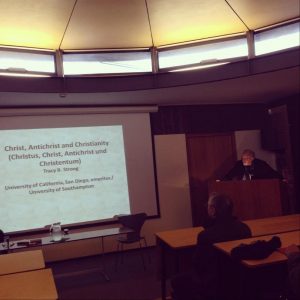
CALL FOR PAPERS: Spring Conference of the Section for Political Theory and the History of Ideas (GPSA) University of Rostock, Germany; 13–15 March 2024
We are delighted to announce that BIAPT 2024 will be hosting a panel convened by our German sister organisation Sektion für Politische Theorie und Ideengeschichte at our January conference. This is a call for papers for the reciprocal panel at their next conference in Rostock next March.
Spring Conference of the Section for Political Theory and the History of Ideas (GPSA)
University of Rostock, Germany; 13–15 March 2024
Convenors: Dennis Bastian Rudolf (University of Rostock), Valerian Thielicke (University of Rostock), Rieke Trimcev (University of Greifswald), Alexander Weiß (University of Rostock)
Political Theory after Eurocentrism: Resources of Non-Western Thinking for Contemporary Political Challenges
Given the ongoing processes of globalization and the emergence of a multipolar world, our sub-discipline plays a crucial role in accompanying these transformations with critical, analytical, interpretive, normative, hermeneutic as well as deconstructive analyses. For this task, it is increasingly implausible to rely unquestioningly on European or Western theories, their problem agendas, arguments, and norms. It is essential for political theory to overcome Eurocentrism. Comparative Political Theory (CPT) has been addressing this concern for more than 30 years by examining non-Western ideas and expanding the canon of political theory and thought globally (Dallmayr 1997, 2004; Jenco et al 2020). The Spring Conference of the GPSA Section for Political Theory and the History of Ideas proposes to further advance this still relatively young program by revisiting the contents, methodologies, and concepts of CPT. The convenors welcome paper proposals that address one of the following four topics:
I. CPT as a research field
Since its inception, CPT has developed in three major strands:
1. Research on non-Western political thought has produced studies and readers on Islamic, African, Indian, Japanese, and Chinese political thought (e.g., Singh/Mohapatra 2010; Dallmayr/Zhao 2012; Martin 2012; Watanabe 2012; March 2015; Dübgen/Skupien 2015; Jenco 2016).
2. A methodological strand explores conceptual and methodological questions regarding units of comparison (e.g., ‘cultural spaces’, ‘cultural areas’, cultures, regions) and, within this strand, the problematic of universalism and relativism remains central, since all contributions are obliged to address this issue (e.g., Dallmayr 2004; March 2009; Godrej 2009; Euben 2010; Freeden/Vincent 2012; von Vacano 2015; Tully 2016; Ackerly/Bajpai 2017; Little 2018; Rollo 2018).
3. Systematic studies exploring global variations in the formation and theorization of concepts such as sovereignty, legitimacy, cosmopolitanism, or democracy (March 2012; Chan/Shin/Williams 2016; Shapcott 2016; Schubert/Weiß 2016; Weiß 2020).
II. CPT as an approach to the history of ideas
Regarding the study of non-Western ideas and their relation to familiar Western sources, studies in CPT advance our understanding of three crucial processes:
1. Mirroring: Throughout history, practices of mutual observation and commentary have helped to construct images of the ‘Other’. These mirrorings, from ancient Greece’s ‘barbarians’ to the reception of Confucianism in the European Enlightenment, provide insights into the content and function of theoretical treatments of the ‘Other’ across a
divided globe. This may include views of Europe and the West in Arab, Persian, African, Indian, Chinese, and Latin American thought, as well as European projections onto Asia (Edward Said’s critique of Orientalism) – and vice versa.
2. Transfers/Travelling ideas: Ideas, positions, and ideologies have migrated across contexts, creating hybrids, and influencing existing ideas. The history of the travelling of concepts such as freedom, legitimacy, harmony, shura, tian xia, swaraj still remains largely unexplored.
3. Translations: Both linguistic and conceptual translations have shaped intellectual history. Examples include At-Tahtāwī’s translation of the French Constitution of 1814 or the transmission of concepts by Japanese delegates during the Meiji Restoration.
III. CPT and its contents
Three thematic areas of CPT will receive special attention, as they allow for fruitful dialogue with other strands within political theory and political science in general:
1. Overcoming Eurocentrism: The goal of ‘historical justice’ challenges the claim of exclusive European authorship for concepts such as democracy, human rights, and other terms central to the contemporary political lexicon. Understanding theoretical positions outside the West allows for contributions to the analysis and interpretation of non-Western regions in conjunction with empirical and area studies. Addressing problems of Eurocentrism in theory raises questions about its historical and contemporary plausibility.
2. The colonial constellation: Postcolonial and decolonial critiques highlight the embeddedness of European conceptualization and ideology within the context of imperialism and colonialism. Examining entanglements of European liberalism with imperialism and its skewed level of justification for colonialism sheds light on the connection between European concepts and non-Western discourses.
3. ‘Democracy’ beyond the West: Non-Western theoretical debates critically engage with Western concepts of democracy by highlighting autochthonous variants and critical reflections on meritocracy, the relationship between constitution and religion, or democratic innovations. Comparative democratic theory and its response to the diversity of meanings and conceptions of democracy are of particular interest.
IV. 30 Years of CPT: Does Political Theory Need to be Transformed?
CPT’s aim is not to delineate its own new field from political theory, but to transform existing research and teaching practices. Accordingly, the conference will inquire into CPTs potential to redefine and to augment political theory. Where can we already identify such redefinitions as a result of CPT? What further steps are necessary and which effects on the sub-discipline can be expected? How can CPT productively transform teaching practices in terms of canon formation, text, and source selection as well as didactic methods?
The conference welcomes contributions from all addressed strands and topics. Researchers of non-Western thought and colleagues exploring general questions within these thematic areas are encouraged to submit proposals. To ensure an international perspective, one of the three conference days (presumably Thursday) will be held in English, allowing for the inclusion of participants with non-German and non-European backgrounds. We particularly encourage emerging researchers to apply. We also aim to provide childcare during the conference.
Please submit proposals (approximately 300 words) for the BIAPT panel to David Owen, dowen@soton.ac.uk, by 30th October 2023. Please note that only on 3 papers can be accepted.


